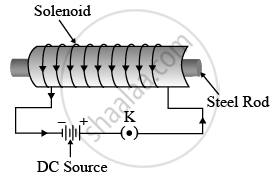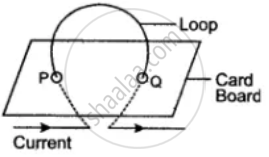Advertisements
Advertisements
Question
Under what conditions permanent electromagnet is obtained if a current carrying solenoid is used? Support your answer with the help of a labelled circuit diagram.
Solution
The following conditions are required to obtain permanent electromagnet when a current-carrying solenoid is used :
- Rod inside the solenoid should be made of a magnetic material like steel which should retain magnetic properties for a long time after magnetization.
- The current through the solenoid should be direct current.
- The number of turns in the solenoid should be large and closely packed so that a strong uniform magnetic field inside it is produced.

APPEARS IN
RELATED QUESTIONS
State the direction in which current-carrying freely suspended solenoid rests
The figure shows a solenoid wound on a core of soft iron. Will the end A be a N pole or S pole when the current flows in the direction shown?

State two ways by which the magnetic field due to a current carrying solenoid can be made stronger.
A current carrying solenoid behaves like a ______.
A current carrying solenoid when freely suspended, it always rests in ______ direction.
Derive the expression for the heat produced due to a current ‘I’ flowing for a time interval ‘t’ through a resistor ‘R’ having a potential difference ‘V’ across its ends. With which name is the relation known? How much heat will an instrument of 12W produce in one minute if it is connected to a battery of 12V?
The diagram shows a current-carrying coil passing through a cardboard sheet. Draw three magnetic lines of force on the board.

State two factors on which magnitude of magnetic field at the centre depends.
What is a solenoid? Why do we usually keep its diameter small in comparison to its length?
What does the divergence of magnetic field lines near the ends of a current carrying straight solenoid indicate?
Ansari Sir was demonstrating an experiment in his class with the setup as shown in the figure below.

A magnet is attached to a spring. The magnet can go in and out of the stationary coil. He lifted the Magnet and released it to make it oscillate through the coil.
Based on your understanding of the phenomenon, answer the following question.
Is there any difference in the observations in the galvanometer when the Magnet swings in and then out of the stationary coil? Justify your answer.
